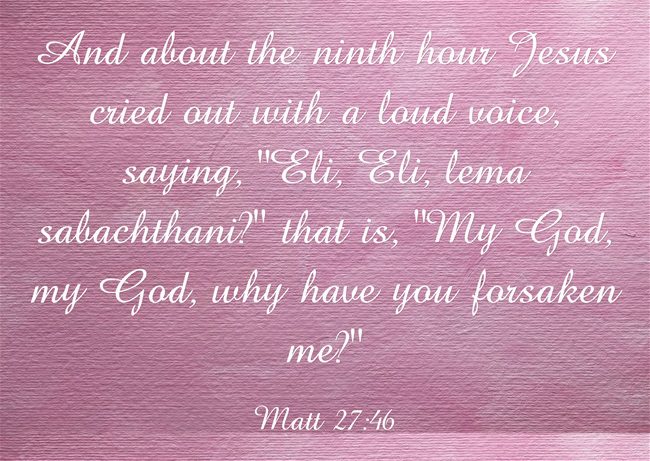What did Jesus say when He said while on the cross “Eli Eli Lama Sabachthani?” What does this mean exactly?
Despised and Abandoned
How many of us have felt abandoned in our faith within our family or workplace? Then think about Jesus Who “was despised and rejected by men man of sorrows, and acquainted with grief; and as one from whom men hide their faces he was despised, and we esteemed him not” (Isaiah 53:3) and especially at the cross where “he was pierced for our transgressions; he was crushed for our iniquities upon him was the chastisement that brought us peace, and with his wounds we are healed” (Isaiah 53:5). The word “rejected” literally means “forsaken” Jesus was forsaken by all men. Only “Mary the wife of Clopas, and Mary Magdalene, Jesus’ mother and the Apostle John” were left (John 19:25) so there was Jesus, the Innocent One dying for the guilty ones but all left alone.
Forsaken at Calvary
As Calvary approached, Jesus knew it was “the will of the Lord to crush him; he has put him to grief; when his soul makes an offering for guilt.” (Isaiah 53:10). Psalm 22 is where Jesus seems to quote when He “cried out with a loud voice, saying, “Eli, Eli, lema sabachthani?” that is, “My God, my God, why have you forsaken me” (Matt27:46). This is one of the rare occasions when the Scripture was in Aramaic; at least part of it was. We don’t have to guess what it means because it translates it for us; “My God, my God, why have you forsaken me.” Jesus’ quote is from Psalm 22:1. Reading the rest of Psalm 22 you can easily tell that it’s describing the crucifixion; Jesus was “scorned by mankind and despised by the people” (Psalm 22:6), saying “all who see me mock me; they make mouths at me; they wag their heads” (22:7); His soul was “poured out like water, and all my bones are out of joint” and His “heart is like wax; it is melted within my breast” (22:14). For three hours, Jesus’ “strength is dried up like a potsherd, and my tongue sticks to my jaws; you lay me in the dust of death” (22:15) and “a company of evildoers encircles me; they have pierced my hands and feet” (22:16). What you read in Psalm 22 is basically what you see happening at Calvary. He was forsaken or as the Strong’s Concordance suggests, it should read “You have left (forsaken, abandoned) me” (Number #G4518). It has been suggested by scholars that in Jesus’ humanity, as the skies remained black for three hours, Christ felt forsaken or abandoned by the Father. It was dark a full three hours; from about 12 noon until about 3 P.M (Matt 27:45). Jesus didn’t cry out this verse (Matt 27:46) until after the third hour of darkness so He endured three hours of utter darkness like everyone else did. Since God is light and the darkness hung like a damp fog, it might have felt like Jesus was completely forsaken, at least for a time.
Atonement on the Cross
The Day of Atonement looked forward to the day of Calvary as they “serve a copy and shadow of the heavenly things” (Heb 8:5) but “Christ has obtained a ministry that is as much more excellent than the old as the covenant he mediates is better, since it is enacted on better promises” (Heb 8:6) and “speaking of a new covenant, he makes the first one obsolete. And what is becoming obsolete and growing old is ready to vanish away” (Heb 8:13). The so-called scapegoat had all the sins of all of the people laid upon his head and he was led out into the wilderness to separate the sins from the people (Lev 16:21-22). Before we are saved we were separated from God by our sins and no goat could take them away (Isaiah 59:2) and so the spotless Lamb of God had to come and offer Himself to take upon Himself our sins. The righteousness we need is His righteousness, where Paul so beautifully illustrates that it was, “For our sake he made him to be sin who knew no sin, so that in him we might become the righteousness of God” (2nd Cor 5:21). Now we can be “at-one” with God which is what atonement means. It is to be “at one ment” or “at-one” with God. Our sins had prohibited this one-on-one relationship but Christ tore down the wall of separation between man and God just like temple veil that was torn from top to bottom that separated the Holy of Holies from the people. Jesus was our scapegoat but for millions more over the years.
Conclusion
IF you have confessed your sins to God, asked for His forgiveness, repented of your sins, and then put your trust in Christ, you are already “at-one” with God through Jesus Christ. There is no other way to be in the kingdom than through Christ (John 6:44) and this narrow, hard way, has only one Whom we must go through (Acts 4:12). At most, there are two paths to God; one is entering into eternal life in an eternal kingdom and be with the King (Rev 22) and the other is entering into judgment and hears the judgment of the Righteous Judge (Rev 10:12-15; 21:8). He can be your Advocate in the judgment or He can be your Judge and Sentencer.
Article by Jack Wellman
Jack Wellman is Pastor of the Mulvane Brethren church in Mulvane Kansas. Jack is also the Senior Writer at What Christians Want To Know whose mission is to equip, encourage, and energize Christians and to address questions about the believer’s daily walk with God and the Bible. You can follow Jack on Google Plus or check out his book Teaching Children the Gospel available on Amazon.












